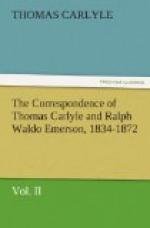I am sorry that Jonathan looks so unamiable seen from your island. Yet I have too much respect for the writing profession to complain of it. It is a necessity of rhetoric that there should be shades, and, I suppose, geography and government always determine, even for the greatest wits, where they shall lay their shadows. But I have always ’the belief that a trip across the sea would have abated your despair of us. The world is laid out here in large lots, and the swing of natural laws is shared by the population, as it is not—or not as much—in your feudal Europe. My countrymen do not content me, but they are susceptible of inspirations. In the war it was humanity that showed itself to advantage,—the leaders were prompted and corrected by the intuitions of the people, they still demanding the more generous and decisive measure, and giving their sons and their estates as we had no example before. In this heat, they had sharper perceptions of policy, of the ways and means and the life of nations, and on every side we read or heard fate-words, in private letters, in railway cars, or in the journals. We were proud of the people and believed they would not go down from this height. But Peace came, and every one ran back into his shop again, and can hardly be won to patriotism more, even to the point of chasing away the thieves that are stealing not only the public gold, but the newly won rights of the slave, and the new muzzles we had contrived to keep the planter from sucking his blood.
Very welcome to me were the photographs,—your own, and Jane Carlyle’s. Hers, now seen here for the first time, was closely scanned, and confirmed the better accounts that had come of her improved health. Your earlier tidings of her had not been encouraging. I recognized still erect the wise, friendly presence first seen at Craigenputtock. Of your own—the hatted head is good, but more can be read in the head leaning on the hand, and the one in a cloak.
At the end of much writing, I have little to tell you of myself. I am a bad subject for autobiography. As I adjourn letters, so I adjourn my best tasks.... My wife joins me in very kind regards to Mrs. Carlyle. Use your old magnanimity to me, and punish my stony ingratitudes by new letters from time to time.
Ever affectionately and gratefully yours,
R.W.
Emerson
CLXXIV. Emerson to Carlyle
Concord, 16 May, 1866
My Dear Carlyle,—I have just been shown a private letter from Moncure Conway to one of his friends here, giving some tidings of your sad return to an empty home. We had the first news last week. And so it is. The stroke long threatened has fallen at last, in the mildest form to its victim, and relieved to you by long and repeated reprieves. I must think her fortunate also in this gentle departure, as she had been in her serene and honored career. We would not for ourselves count covetously the descending steps after we have passed the top of the mount, or grudge to spare some of the days of decay. And you will have the peace of knowing her safe, and no longer a victim. I have found myself recalling an old verse which one utters to the parting soul,—




